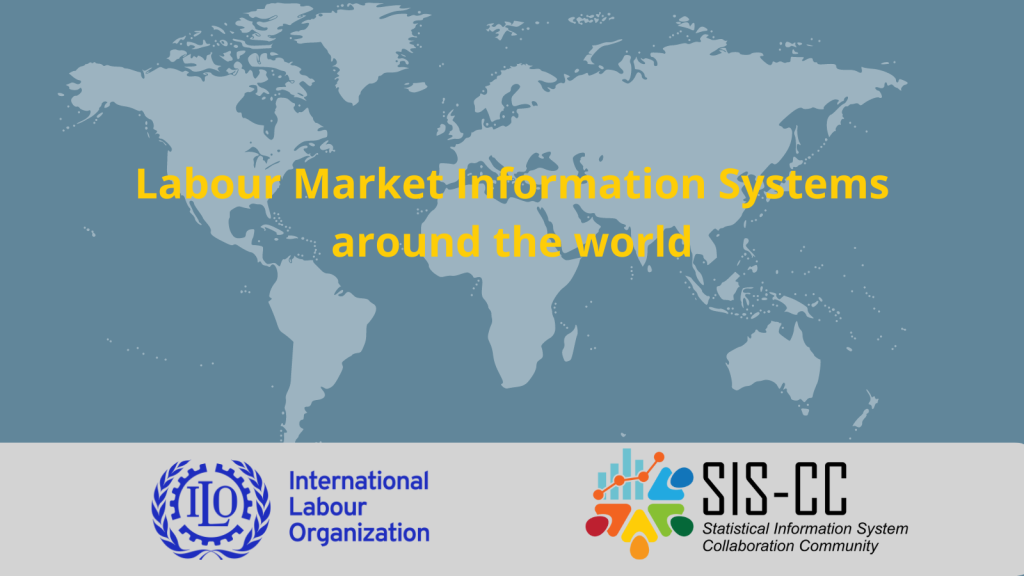
In today’s rapidly changing global economy, labour market information plays a crucial role in shaping policy decisions, enabling effective workforce planning, and promoting sustainable economic development. Recognising this critical need, the International Labour Organization (ILO) has been actively supporting countries around the world in implementing Labor Market Information System (LMIS) projects. Through its SIS-CC membership, the ILO provides the .Stat Suite, along with technical assistance and upgrades, free of charge to all countries following its LMIS recommendations. Under the umbrella of its SIS-CC membership ILO supports countries in the implementation of LMIS to gain extensive information on labour market developments and trends, with the goal to interpret and relate these trends to policies or other factors influencing labour market outcomes.
With over 25 projects currently in progress, let’s take a closer look at some notable LMIS initiatives supported by the ILO across the globe.
INE.Stat Chile: Empowering Data Management and Dissemination
The National Institute of Statistics (INE) in Chile embarked on an initiative in 2014 to improve data management and dissemination processes. With the ILO’s support, the institute is implementing the .Stat Suite, aligning itself with international standards. This move enables INE to streamline statistical dissemination and management, ensuring that high-quality labour market information is readily accessible to policymakers and the public.
LMIS in South Africa: Streamlining Labour Market Information
In collaboration with the ILO, the Department of Employment and Labour in South Africa (DEL) is currently in the process of implementing a robust Labour Market Information System. The new system aims to move away from siloed approaches to data dissemination and streamline the entire process. Through technical capacity building and the implementation of the .Stat Suite, South Africa is poised to enhance its labour market efficiency and support evidence-based policymaking.
NaLMIS – Namibia: Upgrading for better management
The Namibia National Statistics Agency (NSA) initiated its first version of the LMIS in 2019, laying the foundation for better workforce planning and management. However, some internal challenges prevented it from going into production. Undeterred, Namibia collaborated with the ILO to launch a new project in 2022 to upgrade the platform. With additional training on SDMX and Data modeling, NALMIS is now fine-tuning the system with ILO’s assistance, anticipating the launch of an improved LMIS very soon.
SIMEL – El Salvador pioneers LMIS in the region
In December 2021, the Ministry of Labour and Social Security of El Salvador launched SIMEL, the first Labour Market Information System (LMIS) in the Central American region and second of its kind in the Latin American region. SIMEL, with .Stat Suite at its core, responds to the need to overcome the statistical gap in labour matters and to provide timely and internationally comparable statistics to better diagnose the labour situation in the country.
Implementing partners ILO and IOM as well as government officials, diplomatic corps, trade organisations, academia and other sectors of society attended the launch event and acknowledged the benefits of this new, unified repository of labour market information and statistical data.
LMIS embody the analytical capacity to identify and interpret labour market trends
From monitoring or tracking a set of indicators, focusing on relationships in the labour market and between the labour market and the broader economy making use of quantitative methods (e.g. regression analysis), up to the use of comprehensive econometric models to build projections of labour market developments, LMIS embody the analytical capacity to identify and interpret labour market developments and trends, and to relate these trends to policies or other factors influencing labour market outcomes. The SDMX data model facilitates the required data harmonisation, and the SDMX API allows multiple tools to interoperate with .Stat Suite consuming LMIS data and metadata.
The Impact of ILO’s Support
The International Labour Organization’s unwavering support for LMIS projects has had a significant impact on labour markets worldwide. Initiatives like the SIMEL in El Salvador, and the LMIS in South Africa and Namibia, are powerful examples of how data-driven policies and improved skills development can transform economies and bridge the gap between job seekers and employers. These platforms facilitate evidence-based decision-making, ensuring that nations are equipped to face the challenges of the dynamic global workforce.
Building Inclusive and Resilient Labour Markets
As technology continues to advance, LMIS projects supported by the ILO will play an increasingly vital role in creating inclusive and resilient labour markets worldwide. By leveraging the power of data and technology, countries can harness the potential of their workforce, identify skills gaps, and foster sustainable economic growth. The ILO’s commitment to promoting informed decision-making through LMIS initiatives is laying the groundwork for a brighter and more prosperous future for all.


